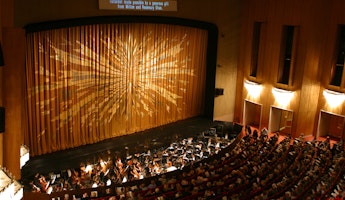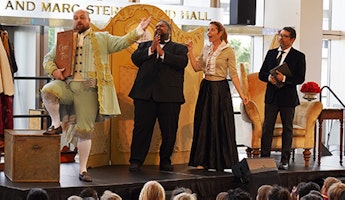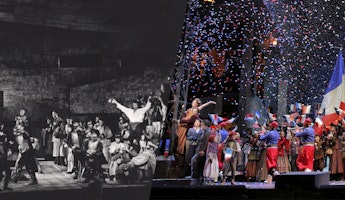Blog
May 24, 2022
All's Fair in Love and War: The Love Story Behind Aida
The opera you've been waiting for is finally back onstage. This lavish new-to-LA production— complete with a full chorus, orchestra, ballet and stunning scenery— brings the full force of opera to the Dorothy Chandler Pavilion. But a production as grand as this needs a love story to match, and Aida is truly the ultimate love story. Our heroine is faced with the ultimate choice between her heart and her homeland in this classic Verdi epic.
Latonia Moore and Russell Thomas, our two star-crossed lovers from rival kingdoms, discussed their characters' timeless romance and what they think makes this opera so special.
AIDA IS A STORY ABOUT WAR AND POWER. BUT IT’S ALSO A STORY ABOUT LOVE. CAN YOU TALK A BIT ABOUT THIS AND YOUR CHARACTERS’ RELATIONSHIP?
Russell Thomas: Well, let's start with this. It's a story about power. And there are people who just happen to be in love with each other. Our situation is you never actually see them really in love on stage except for the denial scene. But that's even manipulative.
Latonia Moore: That’s the hard thing about it. Within the opera, you don't see the love story played out. It’s something that you hear about in the lyrics, that they're both singing about each other and how deeply they feel and how hot they are for each other. But you don't ever see it play it out. You know, I feel like the core of the story is definitely more about the political, more about war and betrayal. But what’s so rad about a love story like this is that no matter what happens in war and politics and all that stuff, even if it means death, love wins. Right?
Russell Thomas: Right. And it's that underpinning of “How much risk is he's willing to take for her?" And that's the part that makes it powerful, is that he's willing to take all these risks for this love that he knows is treasonous, and she's willing to take that risk as well.
Latonia Moore: One thing you don't get in the show and you don't get a lot in the libretto, is how long has Aida actually been there? So I've played it a few different ways. And in our version, I think that Aida has actually been there a while-- years-- and I don't think that she started up with Radames until a little bit later on in her time there. I think that she spent much more time with Amneris and got closer to her than maybe people would think.
Russell Thomas: And that's why when Amneris calls Aida her sister, she believes that. They've been around each other for a long time. I agree with you. I think it has been an ongoing relationship between the two of them.
Latonia Moore: I think [the relationship between Aida and Radames] is a newer thing, especially because the story starts where Amneris has already started suspecting something is going on with Aida and Radames and she's just waiting on her to tell her. And that's what I find really funny about it. Amneris has obviously not talked about Radames to Aida and Aida hasn't talked about him to Amneris. It's just this secret thing going on. Neither one of them are supposed to be with them. I mean, Aida, for obvious reasons, is not supposed to be with him. But for Amneris, of course, maybe she keeps it a secret because she shouldn't be in love with what's just a plain soldier.
LOVE TRIANGLES ARE A QUINTESSENTIAL PART OF A LOT OF OPERAS. DO YOU THINK THIS ONE IS ANY DIFFERENT?
Russell Thomas: I guess the thing that could be different about this love triangle is that nobody knows that the other person is in love with the other person, except for the two people that shouldn't be in love.
Latonia Moore: Yeah, but maybe the thing that's different about it is in this situation, one of the three people has the power to kill the other two. Radames doesn't have that power, and neither does Aida.
But Amneris does, and with the snap of a finger could end it all. What's so wild about it is how many times she hesitates in the opera. She could have said something in Act I, and just said straight out, “I know something's going on,” and call it out. But she didn't. And when everything is finally revealed, she still doesn’t act. Even in Act III when Radames is caught being traitorous, she still doesn’t end it all. She's still in love. She still doesn't want him to die. She's still pleading for him to just lie to save himself. So this love triangle becomes nothing but a straight line, a duet of beauty and love. Like I said at first, love wins.
YOU SAID THAT SO MUCH OF AIDA AND RADAMES’ RELATIONSHIP TAKES PLACE OFF STAGE. WHAT’S IT LIKE FOR YOU BOTH AS PERFORMERS WHEN YOUR CHARACTERS ARE FINALLY TOGETHER?
Latonia Moore: I feel like it's pretty easy to fall into this lovey dovey situation, especially because you've been making googly eyes at each other for two acts and you're not able to touch each other nor talk to each other or acknowledge each other at all. And so once you get to Act III, it's been built up so much, that you're just so happy to be around each other. But I draw a lot from the lyrics.
Russell Thomas: Me too. I think you don't really know the full scope of their love until the tomb scene. You don't really know their love. You see a gesture by him when the King says, “I'll give you anything you want.” He said, “Okay, well then free the prisoners.” That was the first big gesture that you could really see. And I think that if Aida wasn't in love before, she's definitely in love now.
But I think, as performers, knowing each other for as long as we have makes things comfortable. If you feel comfortable with somebody, you can go there and express that love and express that heat, emotion or whatever it is on stage and have it feel real and authentic.
Latonia Moore: It’s true that we've known each other for a while and I have so much respect for Russell. It’s mutual. So when I’m on stage, I want to fall into him. I want to melt into him. I want to almost use his energy. And Russell is just such a comfortable, inviting energy, so he does make it easier than a lot of other on stage romances, I have to say.
AIDA IS ONE OF THE GREATEST OPERAS OF ALL TIME. WHY DO YOU THINK IT’S MADE SUCH A LASTING IMPACT ON AUDIENCES AROUND THE WORLD?
Latonia Moore: Aida is one of the grandest operas in in all of the repertoire. It just is. It's so grand. There are so many people on stage. There's a ballet in the middle of opera, for God's sakes. So there's dancing, there's the scenery, there's amazing singing and the grand costumes, you know, the heroic setting. It’s why it’s timeless.
Russell Thomas: And in the beauty of all of that is that the drama moves quickly. There aren‘t these moments where nothing is happening. Everything moves at a pace that keeps the audience pulled in.
Latonia Moore: That's true, and that's an exception compared to some other grand operas. I mean, there are some grand operas where, you know... I love Don Carlo, for instance. It's one of my very favorites. But there's definitely a lot of excessiveness to it as far as...
Russell Thomas: It takes forever to get to the point.
Latonia Moore: Oh Lord, does it ever! But in Aida, you get straight into it. The story almost starts in the middle of the action. We immediately see the love triangle between Aida, Radames and Amneris. We immediately hear the war cries. It’s just so exciting and so gripping.
Russell Thomas: You also can’t beat the music.








/03-cosi/_dsc0996_pr.jpg?format=auto&fit=crop&w=345&h=200&auto=format)















